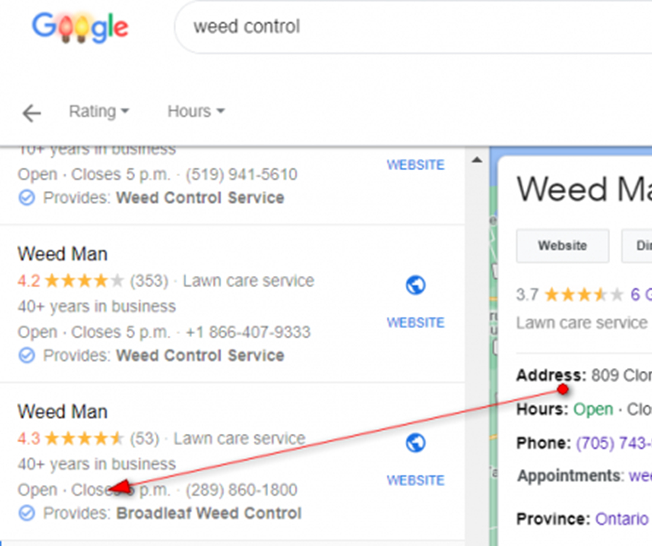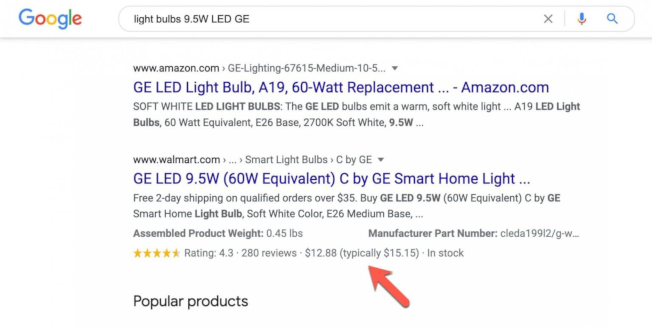The calendar may say 2021, but local search is still adapting, evolving, and learning from last year’s wild challenges. In fact, January brought significant changes including new listings UI, unsolicited features, crowdsourced confirmation of health and safety features, and a huge opportunity for price drops to dominate product-related searches. Let’s dive straight in!
Google My Business (GMB) service menus get an update
GMB recently updated its ability to use a business’s defined services to produce a “provides” highlight on both desktop and mobile SERPs. The service menu in GMB has existed for a long time, of course, but its hard to overstate how much additional value this update brings.

The service menus powering the “provides” section are indexed in the same way Google pulls information from the business’s website, reviews, and Google Posts to give highlighted information in the local 3-pack. As always, any additional information a business can provide for inclusion in the local 3-pack is worth the effort. As Google uses these additional factors to “justify” each listing’s inclusion in local 3-packs, businesses that take advantage could be set to achieve a huge boost in click-through rates.
Review snippets grouped by topic, include third-party reviews
Google review summaries, also known as “review snippets”, are short blurbs about a business that try to capture its general review sentiment. The summary, gathered from existing Google reviews, is placed on the business’s knowledge panel to give an overview of the customer experience without a user needing to look over the reviews themselves. In desktop search, they are part of the business profile. In mobile search, they exist as a standard individual card further down the page.
In January, there were two changes to review summaries: Google is testing grouping review snippets by topic as well as including third-party reviews. So, as a user searches for a jeweler based on something like their diamond selection, Google will try to pull review summaries which specifically mention that stone rather than a general business summary. This update is most evident on the Google Maps mobile app for both Android and iPhone, but is not yet visible on desktop search.
There is, unfortunately, no way a business can control which reviews appear in its summary. We say “unfortunately” because Google tends to include snippets from negative reviews for listings with a rating of 4.3 stars or lower. Businesses simply have to deal with Google showing the bad, regardless of how infrequent it may be, along with the good.
Use Yocale or Touch 2 Success? Check your listings
So, service menus are now being used to drive conversions by “justifying” clicks from the SERP, This was already the case for other features in GMB, such as appointment booking and restaurant menus. However, it seems that two official GMB appointees—Yocale for appointment booking and Touch 2 Success for menu management—are taking advantage by displaying information on listings without notifying business owners.
Yocale is sometimes being added automatically to a business listing in Google Maps without the business knowing. Why is that a problem? Because Yocale issues charges of up to $50 USD for each appointments it books. We have seen food-ordering services being automatically added to restaurants’ Google Maps and Google Local business listings and taking a cut of the profit, but now it seems professional service businesses, like law firms, need to worry about this happening as well.

Touch 2 Success is also possibly adding content to GMB listings by sending unsolicited ownership requests to business listings it works with. Giving ownership of your business listings to a third party is, of course, something you should only do in extremely specific situations. Most businesses will know to decline but Touch 2 Success is sending out these control requests en masse, clearly expecting at least some businesses to accept. Double check that only the businesses you have agreed to work with have access to your listings.
Smart business owners know to never set-and-forget their GMB listings. It is not only a matter of updating your business when you want, but also a matter of stopping unsolicited changes to your business that appear without warning.
Google introduces “price drop” rich results
Google wants to build a shopping platform to compete with the likes of Amazon. With additional product advertising and purchasing options being added every month, the most recent update allows for Google users to find deals via local search they might otherwise miss. Specifically, Google is now allowing a new form of rich result that accounts for price drops on products. It has updated its product-related structured data guidelines to show how businesses can qualify for this new feature.

Image: Search Engine Land
Price drops must be specific to be eligible for these new rich results. Promotions with a vague discount will not appear (e.g. “10-20% off”), but specific deals like “50% off” will. Google calculates price drops based on the pricing you send the search engine via product schema.
This new feature represents an excellent opportunity to make price a strong differentiator in search results. Product rich results stand out considerably in SERPs already, and businesses that utilise such enhancements often drive an increase in clicks.
If you want to promote sale items via Google, make sure your site is fully marked up with the appropriate schema. Price drops will then be visible to users even before they click through to your site, making sure potential customers see the sales you’ve designed specifically for them.
Yelp launches “health and safety measures” community feedback feature
Many businesses promise compliance with local health and safety measures around COVID, but not all deliver. To help expose these bad actors, Yelp now allows community feedback to verify which businesses are following their promised pandemic precautions. Businesses that state their staff wear masks or that they limit the number of customers in store will have that information verified by the community.
A health and safety rating will be given to businesses on Yelp once a consensus is reached by their feedback. If a business has multiple locations, the rating will show up on a per-location basis and only on the locations which directly received the feedback.
Along with user feedback regarding business pandemic health and safety compliance, the launch also features new options for businesses to promote their COVID-safe practices. New service offerings include:
- disposable or contactless menu
- 1:1 sessions available
- heated outdoor seating
With COVID going into its second year, specifying your response to the pandemic is no longer optional—it’s expected.
Want to transform your local listings from an afterthought to a powerful revenue driver? That’s exactly what we do best. Schedule a friendly chat and we’ll go from there!




